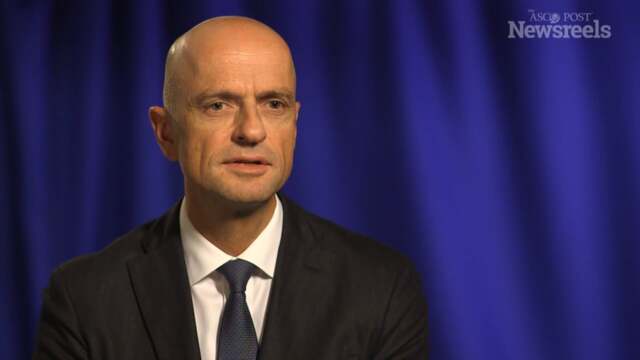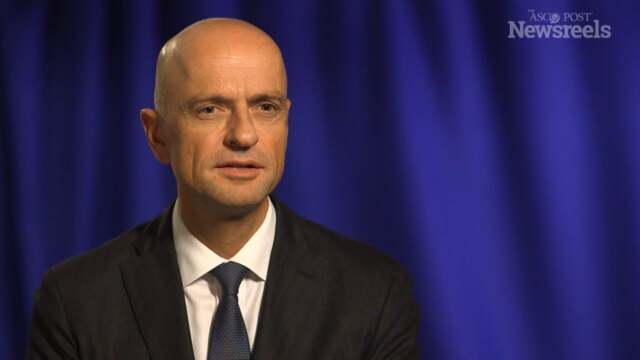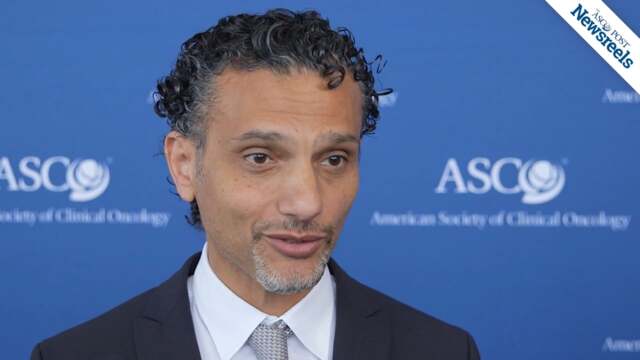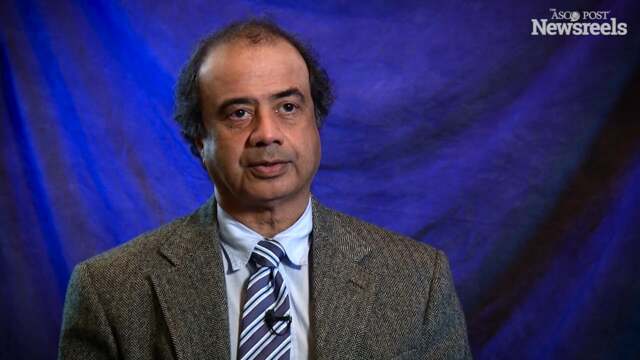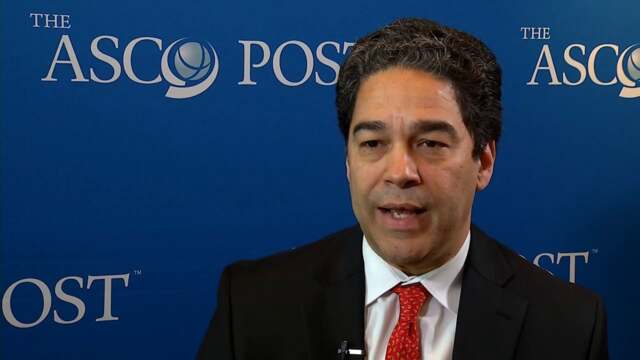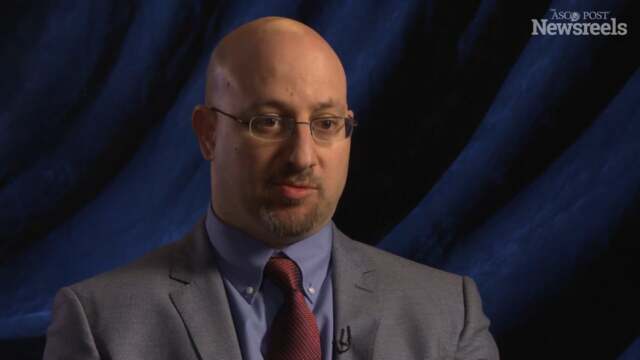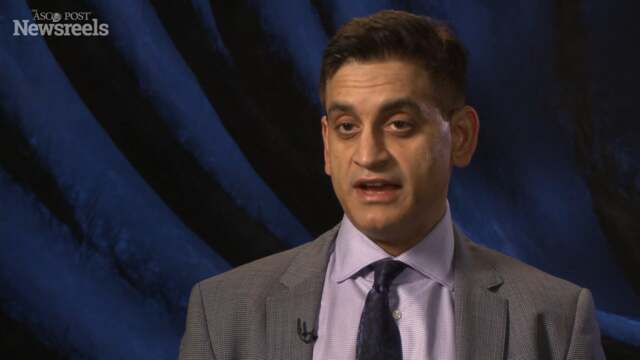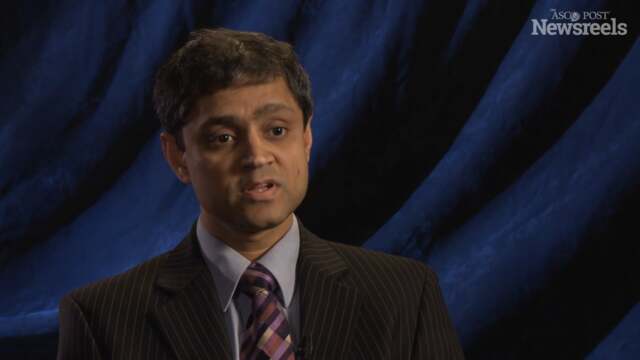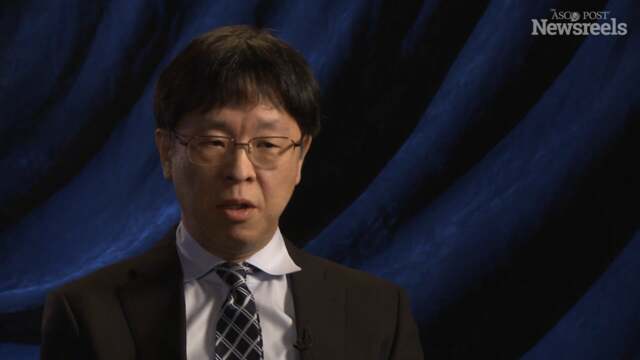2017 GI Cancers Symposium: Nivolumab Demonstrated Efficacy and Improved Survival in Patients With Previously Treated Advanced Gastric Cancer
Results of the ONO-4538-12 trial demonstrated that nivolumab (Opdivo) significantly reduced the risk of death by 37% (hazard ratio [HR] = 0.63; P < .0001) in patients with previously treated advanced gastric cancer refractory to or intolerant of standard therapy, a condition without current ...
2017 GI Cancers Symposium: PET Scans Can Inform and Improve Treatment for Patients With Esophageal Cancer
Findings from a federally funded clinical trial—CALGB 80803 (Alliance)—point to a new way to improve the outlook for patients with esophageal cancer: using positron-emission tomography (PET) scans to assess tumor response to initial chemotherapy may allow doctors to tailor further...
TCGA Study of Esophageal Cancers Finds Features That Aid in Their Classification
A new integrated genomic study by The Cancer Genome Atlas (TCGA) Research Network identified genetic alterations that distinguish the two most common subtypes of esophageal cancer. Esophageal cancer is a rare cancer in the United States, but the 8th most frequently diagnosed cancer worldwide. It...
CAP/ASCP/ASCO Guideline on HER2 Testing and Clinical Decision-Making in Gastroesophageal Adenocarcinoma
As reported by Angela N. Bartley, MD, of St Joseph Mercy Hospital, Ann Arbor, and colleagues in the Journal of Clinical Oncology, the College of American Pathologists (CAP), the American Society for Clinical Pathology (ASCP), and ASCO have released a guideline on HER2 testing and clinical...
Locally Advanced Esophageal Cancer Outcomes Improved With Neoadjuvant Therapy
In studies presented at the 2016 European Society for Surgical Oncology (ESMO) Congress, two different neoadjuvant treatment approaches improved the outcomes of patients with esophageal cancer. Investigators from the Australasian Gastro-Intestinal Trials Group (AGITG) reported that the addition of...
Meta-analysis Identifies New Genetic Variants for Barrett’s Esophagus and Esophageal Adenocarcinoma
As reported in The Lancet Oncology, Puya Gharahkhani, PhD, of QIMR Berghofer Medical Research Institute, Brisbane, Australia, and colleagues identified several new genetic risk variants for the development of Barrett’s esophagus and esophageal adenocarcinoma through a large-scale meta-analysis of...
Higher Complete Pathologic Regression Rate With Neoadjuvant Docetaxel- vs Epirubicin-Based Triplets in Gastric/Gastroesophageal Junction Cancer
In the phase II portion of a German phase II/III trial (FLOT4) reported in The Lancet Oncology, Al-Batran et al found that preoperative docetaxel-based vs anthracycline-based triplet therapy produced a higher complete histopathologic regression rate in patients with resectable gastric or...
Presence of Oral Bacterium in Esophageal Cancer Samples Associated With Shorter Patient Survival
Among Japanese patients with esophageal cancer, those whose cancer tested positive for DNA from the bacterium Fusobacterium nucleatum had shorter cancer-specific survival compared with those whose cancer had no DNA from the bacterium, according to study results published by Yamamura et al in...
Proton Pump Inhibitors Seem to Reduce the Efficacy of Capecitabine in Advanced Gastroesophageal Cancer
In a secondary analysis of a clinical trial reported in JAMA Oncology, Chu et al found that use of proton pump inhibitors (gastric acid suppressants) reduced the effectiveness of oral capecitabine in patients with advanced gastroesophageal cancer. The study involved analysis of the effect of...
Martin H. Schuler, MD, on Gastric and GEJ Adenocarcinoma: Results of the FAST Study (German Language Version)
Martin H. Schuler, MD, of the University Hospital Essen, discusses in German findings from this phase II trial of epirubicin, oxaliplatin, and capecitabine with or without the antibody IMAB362 as first-line therapy in patients with advanced CLDN18.2+ disease. (Abstract 614O)
Martin H. Schuler, MD, on Gastric and Gastroesophageal Junction Adenocarcinoma: Results of the FAST Study
Martin H. Schuler, MD, of the University Hospital Essen, discusses findings from this phase II trial of epirubicin, oxaliplatin, and capecitabine with or without the antibody IMAB362 as first-line therapy in patients with advanced CLDN18.2+ disease. (Abstract 614O)
Meta-analysis Identifies New Genetic Variants for Barrett’s Esophagus and Esophageal Adenocarcinoma
As reported in The Lancet Oncology, Gharahkhani et al identified several new genetic risk variants for the development of Barrett’s esophagus and esophageal adenocarcinoma through a large-scale meta-analysis of genome-wide studies. Study Details The study involved a meta-analysis of four...
New Preclinical Study Shows Esophageal Cancers Driven by 'Marginal Gain' Rather Than Speed
Wellcome Trust Sanger Institute scientists have shown that unexpectedly, esophageal cancer cells do not divide faster than their normal neighbors. Unlike normal cells, however, the tumor cells produce slightly more dividing daughter cells than nondividing cells, forming a tumor. The study,...
Association Between Germline Mutation in VSIG10L and Barrett's Esophagus/Esophageal Cancer
Researchers at University Hospitals Case Medical Center have discovered that a rare genetic mutation is associated with susceptibility to familial Barrett's esophagus and esophageal cancer. The findings were published by Fecteau et al in JAMA Oncology. Amitabh Chak, MD, of University Hospitals...
Comparison of Chemotherapy Regimens in Metastatic Esophageal and Gastroesophageal Junction Adenocarcinoma
FOLFOX (oxaliplatin, leucovorin, fluorouracil [5-FU]) seems to be a safer and more reliable regimen than ECF (epirubicin, cisplatin, 5-FU) and irinotecan/cisplatin as a backbone for treatment in future studies of metastatic esophageal and gastroesophageal junction cancers. This finding from the...
Anti–PD-1 Treatment With Pembrolizumab in Gastric/Gastroesophageal Junction Cancers: Who Is Likely to Respond?
Immune checkpoint inhibitors have emerged as one of the most promising new areas of drug development in oncology. Broad activity has been observed for these agents across a spectrum of hematologic malignancies and solid tumors. As reviewed in this issue of The ASCO Post, Muro and colleagues now...
Pembrolizumab Active in PD-L1–Positive Advanced Gastric Cancer and Triple-Negative Breast Cancer
The KEYNOTE-012 phase Ib trial assessed single-agent pembrolizumab (Keytruda) in patients with advanced programmed cell death ligand 1 (PD-L1)–positive gastric cancer, triple-negative breast cancer, urothelial cancer, and head and neck cancer. The activity of pembrolizumab in study patients with...
First-in-Class Antibody Reduces Gastric Cancer Recurrence
A novel immunotherapy agent, the first in its class, reduced disease progression by more than 50% when added to standard chemotherapy for patients with advanced gastric cancer, according to results from an international phase II trial presented at the 2016 ASCO Annual Meeting.1 The drug, IMAB362,...
Salah-Eddin Al-Batran, MD, on Gastric and GEJ Adenocarcinoma: Results From the FAST Trial
Salah-Eddin Al-Batran, MD, of the Institute of Clinical Cancer Research and Nordwest Hospital, discusses findings from this international phase II study of epirubicin, oxaliplatin, and capecitabine with or without IMAB362, as first-line treatment of gastric and gastroesophageal junction adenocarcinoma (Abstract LBA4001).
Survival Period for Esophageal Cancer Is Tied to Race and Income
African American patients with esophageal cancer survive fewer months after diagnosis than white patients, but only if they also have low incomes, according to a study presented by Loretta Erhunmwunsee, MD, at the Annual Meeting of the Society of Thoracic Surgeons. Dr. Erhunmwunsee led the study...
Jaffer Ajani, MD, on Metastatic Gastroesophageal Cancers: Expert Perspective
Jaffer Ajani, MD, of The University of Texas MD Anderson Cancer Center, discusses the importance of HER2/neu testing and other aspects of treating patients with advanced gastroesophageal adenocarcinoma.
Possible Overuse of PET to Detect Recurrence of Lung and Esophageal Cancers
Healy et al found that greater use of positron-emission tomography (PET) for detection of recurrence of lung and esophageal cancers was not associated with improved survival, suggesting potential overuse of the modality in this setting. They reported their results in the Journal of the National...
Swedish Study Shows Association of Survival Gain With Increased Surgeon Experience in Patients Undergoing Esophagectomy for Cancer
Increased surgeon experience was associated with markedly better short- and long-term survival in patients undergoing esophagectomy for esophageal cancer, according to a report by Markar et al in the Journal of Clinical Oncology. Study Details The study involved data from 1,821 patients who...
Researchers Find Possible Association Between Oral Bacteria and Esophageal Cancer
University of Louisville School of Dentistry researchers have found that a bacterial species responsible for gum disease, Porphyromonas gingivalis, is present in 61% of patients with esophageal squamous cell carcinoma. The findings, published by Gao et al in Infectious Agents and Cancer, only...
PET Scan Use in Follow-up Care for Lung and Esophageal Cancer Shows Wide Variation Between Hospitals, No Impact on Survival
A new study suggests that one approach to watching for a cancer's return is being inappropriately used at many hospitals and isn't helping patients survive longer. The findings are published by Healy et al in the Journal of the National Cancer Institute. The study looked at how often survivors ...
Hans Gerdes, MD, on Endoscopic Therapies for Early-Stage Esophageal Cancers
Hans Gerdes, MD, of Memorial Sloan Kettering Cancer Center, discusses a new approach to the management of early-stage esophageal cancers with endoscopic resections.
Martine Frouws, MSc, PhD, on Postdiagnosis Aspirin and Improved Survival in All GI Cancers
Martine Frouws, MD, PhD Candidate, of Leiden University Medical Centre discusses her study, which showed a significant increase in overall survival among patients with GI cancers who took aspirin compared to those who did not (Abstract 2306).
Leonard Gunderson, MD, on the Presidential Symposium Lecture on Upper and Lower GI Cancers
Leonard Gunderson, MD, of the Mayo Clinic College of Medicine, discusses PET/CT imaging in upper and lower gastrointestinal cancers, which can be of value as a baseline study prior to treatment, in determining the degree of response to treatment, and in helping decide whether there is a relapse after a complete response to treatment.
Anita Mahajan, MD, on Radiotherapy Advances in the CNS and Aerodigestive Tract
Anita Mahajan, MD, of MD Anderson Cancer Center, summarizes results from three clinical trials on radiation therapy for ependymoma, locally advanced thoracic esophageal squamous cell carcinoma, and meningioma (Abstracts 31, 1, 7).
Dung T. Le, MD, on Gastric or Gastroesophageal Junction Cancer: Results From the CheckMate-032 Trial
Dung T. Le, MD, from Johns Hopkins University Sidney Kimmel Comprehensive Cancer Center, discusses study findings on the safety and activity of nivolumab monotherapy in advanced and metastatic gastric or gastroesophageal junction cancer (Abstract 6).
Jonathan R. Strosberg, MD, on Neuroendocrine Tumors: Results of the NETTER-1 Trial
Jonathan R. Strosberg, MD, of H. Lee Moffitt Cancer Center and Research Institute, discusses progression-free survival, radiographic response, and preliminary overall survival findings of this phase III study on midgut neuroendocrine tumors treated with lutetium Lu-177 dotatate (Abstract 194).
Yoon-Koo Kang, MD, PhD, on Gastric/Gastroesophageal Junction Adenocarcinoma: Trial Results for T-DM1 vs a Taxane
Yoon-Koo Kang, MD, PhD, of the Asan Medical Center, discusses findings from this multicenter, phase II/III study of ado-trastuzumab emtansine vs a taxane in patients with previously treated HER2-positive locally advanced or metastatic gastric/gastroesophageal junction adenocarcinoma (Abstract 5).
Simron Singh, MD, on Neuroendocrine Tumors of the GI Tract: Results from the RADIANT-4 Trial
Simron Singh, MD, of the Toronto Sunnybrook Cancer Centre, discusses an analysis of data from this phase III study on the efficacy and safety of everolimus in advanced, progressive, nonfunctional neuroendocrine tumors of the GI tract and unknown primary (Abstract 315).
Somnath Mukherjee, MD, on Esophageal Adenocarcinoma: Results of the NEOSCOPE Trial
Somnath Mukherjee, MD, of Oxford University, discusses this phase II study of induction chemotherapy followed by either oxaliplatin/capecitabine- or paclitaxel/carboplatin-based chemoradiation as a pre-operative regimen for resectable esophageal cancer.. (Abstract 3).
Toshihiko Doi, MD, PhD, on Esophageal Carcinoma: Study Results From KEYNOTE-028
Toshihiko Doi, MD, PhD, of Japan’s National Cancer Center Hospital East, discusses updated results on pembrolizumab for advanced esophageal cancer (Abstract 7).
STS 2016: Race, Lower Socioeconomic Status Linked With Worse Survival Following Esophageal Cancer Surgery
Poor black patients undergoing surgery for esophageal cancer are at higher risk for death than white patients and patients with higher socioeconomic status, according to a scientific presentation by Erhunmwunsee et al at the 52nd Annual Meeting of The Society of Thoracic Surgeons. The abstract,...
Preoperative Chemoradiotherapy May Extend Survival for Patients with Esophagogastric Junction Adenocarcinoma
Several American and European clinical trials have yielded mixed results on the survival advantage of preoperative chemoradiotherapy for patients with locally advanced esophagogastric junction adenonocarcinoma. However, a distinguished panel at the 2011 ASTRO Annual Meeting did agree that surgery...
Most Hospitals Do Not Meet Benchmark for Examining Lymph Nodes following Esophagectomy
“Fewer than one-third of patients and fewer than 1 in 10 hospitals met the benchmark of examining at least 15 lymph nodes” following esophagectomy for patients with esophageal cancer, according to a retrospective observational study reported in the Archives of Surgery. That benchmark was set by the ...
Second-line Docetaxel Improves Esophageal and Gastric Cancer Survival
A phase III study from the United Kingdom has shown that second-line treatment with docetaxel improves overall survival of patients with advanced esophagogastric cancer.1 The strategy has already been widely adopted, but COUGAR-02 is the first study to provide definitive evidence of a survival...
New Research Presented in Breast, Gastric, Esophageal Cancers, Melanoma, and Multiple Myeloma, plus Supportive Care
Attendees at the ASCO Annual Meeting are faced with a major challenge of trying to attend as many important sessions as they can over a 4-day period. Our challenge is to feature the major news in The ASCO Post. In addition to our regular comprehensive coverage of key presentations, the following...
Anti–VEGFR-2 Antibody Ramucirumab Prolongs Survival in Previously Treated Advanced Gastric or Gastroesophageal Cancer
Vascular endothelial growth factor (VEGF)– and VEGF receptor-2 (VEGFR-2)–mediated signaling and angiogenesis seem to have an important role in the pathogenesis of gastric cancer. In the phase III REGARD trial reported in Lancet, Charles S. Fuchs, MD, MPH, of Dana-Farber Cancer Institute, Boston,...
Cetuximab Fails to Improve Survival in Nonoperable Esophageal Cancer
More data have emerged that discount the potential for benefit with epidermal growth factor receptor (EGFR) inhibitors in esophageal cancer. The latest comes from the RTOG 0436 randomized phase III trial in patients with nonoperable esophageal cancer, the results of which were presented at the 2014 ...
Ramucirumab for Advanced or Metastatic Gastric or Gastroesophageal Junction Adenocarcinoma
On April 21, 2014, ramucirumab (Cyramza) was approved for use as a single agent in the treatment of patients with advanced or metastatic gastric or gastroesophageal junction adenocarcinoma with disease progression on or after prior treatment with fluoropyrimidine- or platinum-containing...
Rilotumumab Added to First-Line Chemotherapy May Benefit Patients With Advanced Gastric or Esophagogastric Junction Adenocarcinoma
Hepatocyte growth factor (HGF) and its receptor MET have been found to promote the proliferation, migration, and survival of tumor cells and to play a role in gastric cancer. In a phase II study reported in The Lancet Oncology, Timothy Iveson, MD, of the University Hospital Southampton NHS...
IGF-2/IGF-1R Inhibition Shows Promise in Esophageal Cancer
In a study reported in Clinical Cancer Research, Li and colleagues found that overexpression of Id1 protein resulted in insulin-like growth factor (IGF)-2 production, which, in turn, resulted in esophageal cancer cell proliferation, survival, and invasion via autocrine activation of AKT....
EGFR as a Therapeutic Target for Gastroesophageal Cancer—or Is It Really?
The epidermal growth factor receptor (EGFR) gene is often amplified and its protein overexpressed in upper gastrointestinal cancers—and overexpression has prognostic value. With the advent of monoclonal antibodies and tyrosine kinase inhibitors against EGFR, we have witnessed a rash of randomized...
No Overall Survival Improvement but Some Palliative Benefit With Gefitinib in Esophageal Cancer Progressing Postchemotherapy
In what may be the first randomized trial of systemic therapy in this setting, Susan J. Dutton, MSc, of University of Oxford, United Kingdom, and colleagues evaluated the epidermal growth factor receptor (EGFR) tyrosine kinase inhibitor gefitinib vs placebo in patients with esophageal cancer...
TRIM44 Amplification in Esophagogastric, Breast Tumors May Be Marker for mTOR Inhibitor Therapy
TRIM44 family overexpression is associated with carcinogenesis, and TRIM44 has been identified as a prognostic gene. In a study reported in Journal of the National Cancer Institute, Ong and colleagues attempted to identify therapeutic strategies for patients with TRIM44 overexpression. Genomic and...
Researchers at Roswell Park Receive Grants to Study New Anticancer Agent in Lung, Colorectal, and Gastrointestinal Cancers
Researchers at Roswell Park Cancer Institute have been awarded three of four grants by the National Comprehensive Cancer Network (NCCN) Oncology Research Program to evaluate and define the clinical effectiveness of the investigational compound nintedanib. Nintedanib is an investigational...
Radiation Alone Is as Effective as and Less Toxic Than Chemoradiation for Advanced Esophageal Cancer
Radiation therapy alone was found to be as effective as chemoradiation in reducing dysphagia associated with advanced esophageal cancer in the palliative setting and was less toxic, according to results of a multinational phase III trial called the Trans-Tasman Radiation Oncology Group (TROG) 03.01 ...
